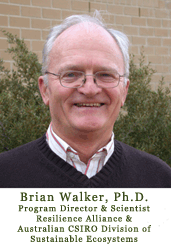Brian Walker
From an “Ecologist Directory” maintained by the ESA Education Office about 2004-2005. Profile circa 2004.
Degree Ph.D.
Position Program Director & Scientist
Department Australian CSIRO Division
Organization The Resilience Alliance & Sustainable Ecosystems
Dr. Walker is one of the recipients of ESA’s 2004 Sustainability Science Award for the following paper: Scheffer, M., Carpenter, S., Foley, J., Folke, C., and Walker, B. 2001. Catastrophic shifts in ecosystems. Nature, vol. 413: 591-596.
When did you get interested in ecology? Who was most influential in guiding you into ecology?
I became interested in ecology as young boy, growing up in Zimbabwe. The person most influential in guiding me into ecology was Dr Oliver West, a Zimbabwean ecologist who undertook the first ecological studies in that country in the 1950s.

How did you learn about ecological careers? What is your position title now?
I learned about ecological careers after I finished my undergraduate degree (in agriculture). I am currently Program Director of The Resilience Alliance (half-time) and a scientist in the Australian CSIRO Division of Sustainable Ecosystems (half-time).
Describe your route to a career in (or using) ecology. What challenges did you need to overcome? What was your training, and what positions have you held?
I began my career, after a B.Sc. in Agriculture, as a Land Development Officer in Zimbabwe. After 3 years, I realized my interest was in ecology, and I moved to Canada where I obtained a Ph.D. in Ecology from the University of Saskatchewan. After a short term in applied agricultural ecology research back in Zimbabwe, I moved to the University of Zimbabwe as lecturer in Ecology (6 years). I then moved to the University of the Witwatersrand in Johannesburg, South Africa, as Professor of Botany, where I established a Centre for Resource Ecology. After 10 years there I moved to Australia (in 1985) as Chief of the CSIRO Division of Wildlife and Ecology. I stepped down from that position at the end of 1999 in order to get back into research.
What key advice would you offer a student today?
Follow your heart in what interests you; make sure you get a really good understanding (through field experience) of biology and ecosystem dynamics; ensure that your coursework includes a good grounding in maths.
What advice do you have for communicating ecology to diverse audiences?
Clear, simply explained examples. Avoid jargon.